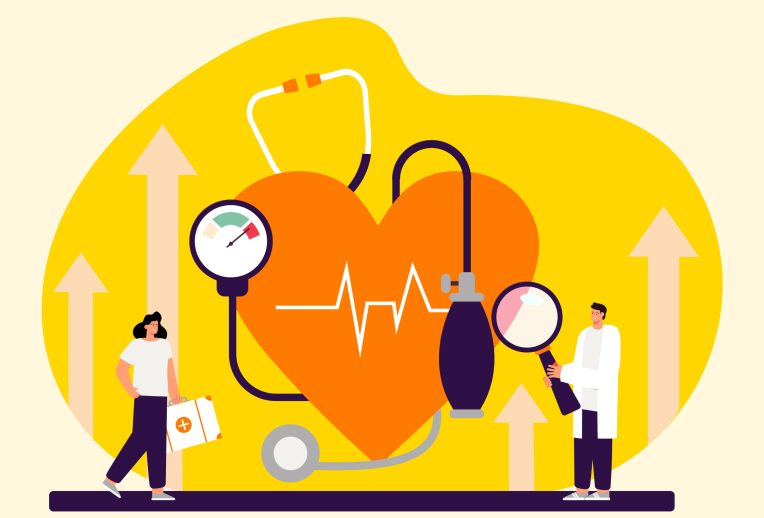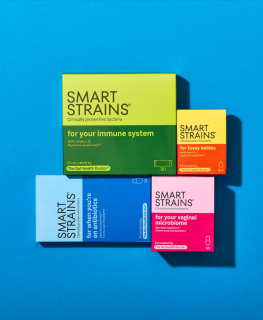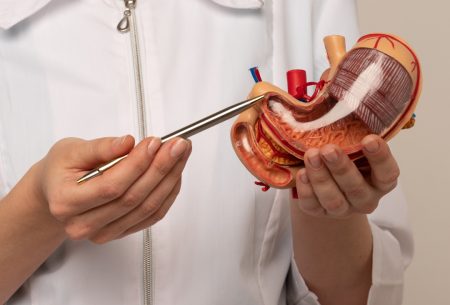When you think of factors that could compromise your long-term health, does high blood pressure spring to mind? Known as the ‘silent killer’, this common condition affects around one in three adults in the UK, often without obvious symptoms. While it’s true there are some risk factors outside of your control, like genetics and age (and stages of life like the menopause), in the vast majority of cases, high blood pressure can be improved through lifestyle factors such as diet, stress levels and exercise. So let’s look at whether your blood pressure solution could lie in your kitchen cupboard? Or perhaps in your gut health?
Seven gut-centric hacks for healthy blood pressure

Why your blood pressure matters more than you think
Blood pressure is a measure of how strongly your blood presses against the walls of your arteries. It’s made up of two numbers: systolic (when the heart contracts) and diastolic (when it relaxes). A reading of 140/90mmHg or above (or 150/90mmHg if you’re over 80) is generally considered high.
This isn’t just about arbitrary numbers on a machine. Persistent high blood pressure increases your risk of serious health problems, including heart attacks, strokes, kidney disease, vision loss, and dementia. While ageing is an undeniable risk factor (our arteries naturally stiffen over time), research also shows blood pressure tends to creep up from our 40s onwards at much higher rates than would be expected from ageing alone. What’s more, heart attacks are rising in younger women, which is why the British Heart Foundation recommends all women over the age of 40 visit their local GP or nurse for a free NHS health check (which includes blood pressure measurement).
The good news? In many cases, lifestyle changes can significantly lower blood pressure, sometimes as effectively as medication. Even a drop of 5mmHg, which might sound small, has been shown to cut the risk of heart attack or stroke by around 10%. Better still, many of the most effective science-backed strategies we will share with you are easy tweaks you can start making today.
Seven gut-friendly ways to support healthy blood pressure
 1. Your microbes might be messing with your blood pressure
1. Your microbes might be messing with your blood pressure
There’s growing evidence linking a diverse gut microbiome with healthier blood pressure. A systematic review (where they pool all the studies on a topic together) examined changes in gut microbiota among those with high blood pressure (aka hypertension). The study found that those with hypertension exhibited significant alterations in their gut microbial composition compared to those without hypertension. Specifically, there was a decrease in beneficial bacteria that produce short-chain fatty acids (shown to support blood vessel function) and an increase in opportunistic pathogens. These microbial shifts were also correlated with the severity of hypertension.
Tip: Aim for 30+ different plant-based foods each week. Include a variety of plants across the Super Six (vegetables, fruits, legumes, wholegrains, nuts and seeds, and herbs and spices). Read more about plant points here.
 2. Power up with potassium
2. Power up with potassium
Potassium helps your body ‘flush out’ excess sodium (salt), relaxes blood vessels, and in turn can help balance blood pressure.
Good sources of potassium include:
- Bananas
- Fermented dairy (e.g. kefir, live yoghurt)
- Potatoes
- Tuna (fresh or tinned in water, not brine due to the salt)
- Legumes (beans, lentils, chickpeas)
- Avocados
Tip: Add a banana to your breakfast, lentils to your pasta dishes, or enjoy a delicious gut-loving recipe like this high-fibre banana, fig & courgette loaf for a potassium-packed boost.
 3. Get savvy with your salt intake
3. Get savvy with your salt intake
Increasing potassium isn’t license to pile on the salt. Cutting your salt intake – ideally to under 6g a day – can reduce blood pressure by 2–8mmHg. Around 70% of our salt comes from processed foods, so check your food labels. Foods with more than 1.5g of salt (or 0.6g sodium) per 100g are considered high in salt.
If you’re concerned that less salt means less flavour and food enjoyment, it’s worth being aware that your tastebuds regenerate every 10 or so days. So if you slowly start to reduce the salt across your meals, your taste buds actually become more salt sensitive. This means they’re more satisfied with less salt.
Tip: Alongside slowing down your salt intake, try flavouring your food with herbs and spices instead. For example, smoked paprika and garlic powder are delicious, sodium-free swaps. Some people may also benefit from potassium chloride-based salt alternatives; however, these should be avoided by those with chronic kidney disease.
 4. Fermented and functional
4. Fermented and functional
Did you know yoghurt could support your blood vessels? Certain fermented dairy foods may help block angiotensin-converting enzyme (ACE), which constricts blood vessels. One 2018 study published in the Journal of Hypertension found that people who ate yoghurt more than five times a week had a 19% lower risk of high blood pressure.
Tip: Choose plain, live yoghurt (or kefir – like our Bio&Me range) and stir it through soups, dollop it on curries or enjoy this frozen live yoghurt bark recipe.
 5. Break up with your chair
5. Break up with your chair
It’s no secret that regular exercise plays a crucial role in supporting heart health. But even light activity throughout the day can help. One study in older adults found that 30 minutes of moderate walking daily, plus getting up for three-minute strolls every half hour, reduced blood pressure by around 5 mmHg.
Tip: Set yourself a reminder on your phone to get up and stretch, stand or walk every 30 minutes during the day – it all adds up.
 6. Is your evening drink pushing up your numbers?
6. Is your evening drink pushing up your numbers?
Even moderate alcohol consumption can affect your blood pressure. A 2019 study in the Journal of the American College of Cardiology found that people who drank 7–13 units per week had higher blood pressure compared to non-drinkers. This is because alcohol can increase the hormone renin, which can cause blood vessels to constrict.
Tip: Try our pear ginger spritz or kombucha (check here for tips on selecting a high-quality kombucha brand). If you really want to enjoy a few tipples, alternate alcoholic drinks with sparkling water (it will also help ease the throbbing head the next day). A review in The Lancet found that people who halved their alcohol intake saw their systolic blood pressure drop by around 5mmHg.
 7. A sweet treat with heart-smart benefits
7. A sweet treat with heart-smart benefits
Yes, really. Cocoa is rich in flavonoids, plant compounds that have been shown to help relax blood vessels and improve their function. The Cochrane Collaboration reviewed 20 trials and found that consuming 25–40g of dark chocolate (at least 85% cocoa solids) daily resulted in a 2–3mmHg drop in blood pressure within weeks.
Tip: If the darkest chocolate tastes too bitter for you, start with 75% and work up over time – your tastebuds will adjust. Enjoyment can be further enhanced by eating it with a hot drink, which helps bring out the creamy tones of the 85%+. A gut-loving snack like these no-bake brownies will help! Enjoy earlier in the day if you’re caffeine-sensitive (did you know 50g of dark chocolate contains around 40mg of caffeine?).

Takeaway
For most people, high blood pressure develops gradually and often without noticeable symptoms. But just because it’s silent doesn’t mean it should be ignored. Small lifestyle shifts can lead to meaningful improvements in your numbers — and your long-term health. The good news? Many of these shifts are delicious, gut-friendly, and totally achievable.
From boosting potassium with real foods, to enjoying a square of dark chocolate, and even feeding your gut microbes more diversity — it’s not about restriction or extremes, but realistic, everyday strategies. Make simple, sustainable swaps that support not just your blood pressure but your overall wellbeing. Your future self will thank you!
If you’re concerned about your blood pressure or want personalised support, speak to your GP or reach out to one of our specialist dietitians at The Gut Health Clinic.
Do you have a loved one who might also benefit from this blog? You can easily share it with them using the links below.

Is your gut healthy?
Take our quick quiz to give you helpful insight into the current state of your gut health. By assessing your symptoms, family history, immunity, mood and other lifestyle factors, you can be informed on the most effective areas to kickstart your own gut health transformation.













